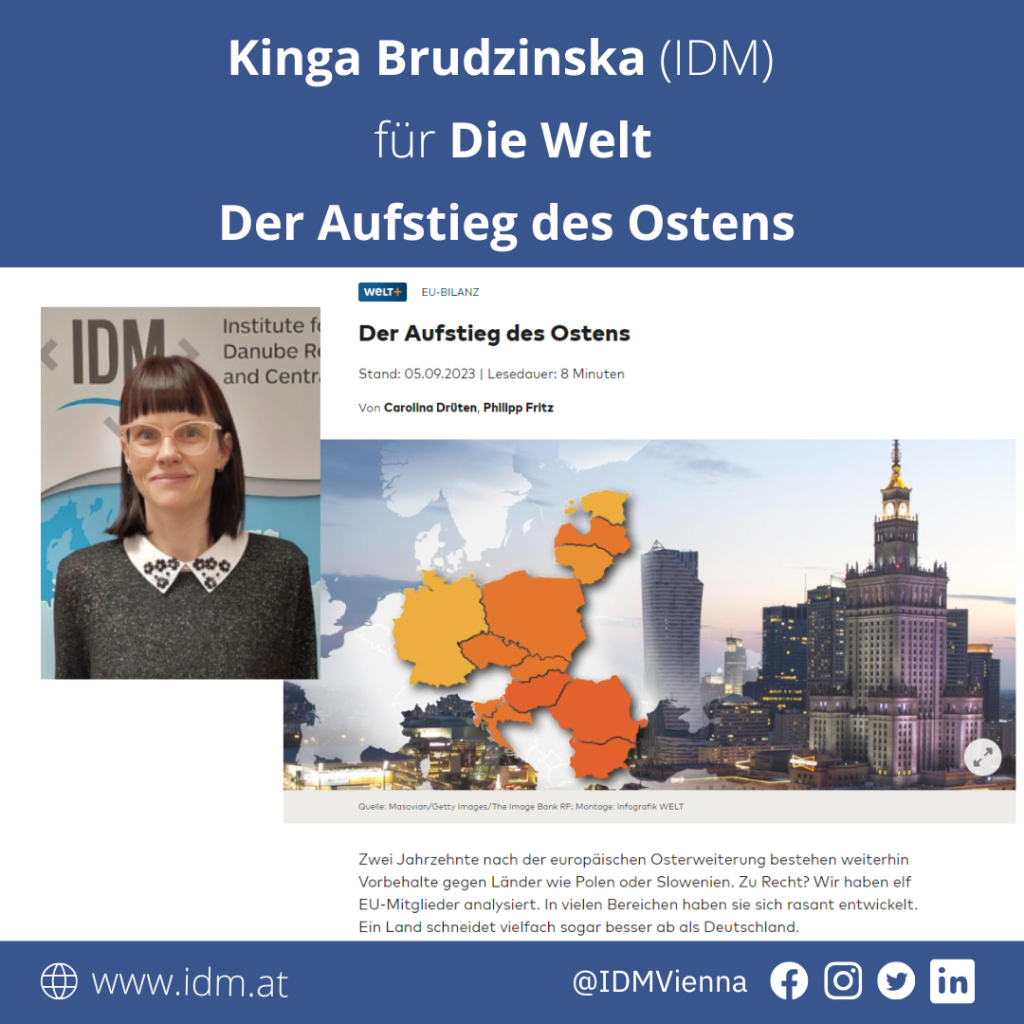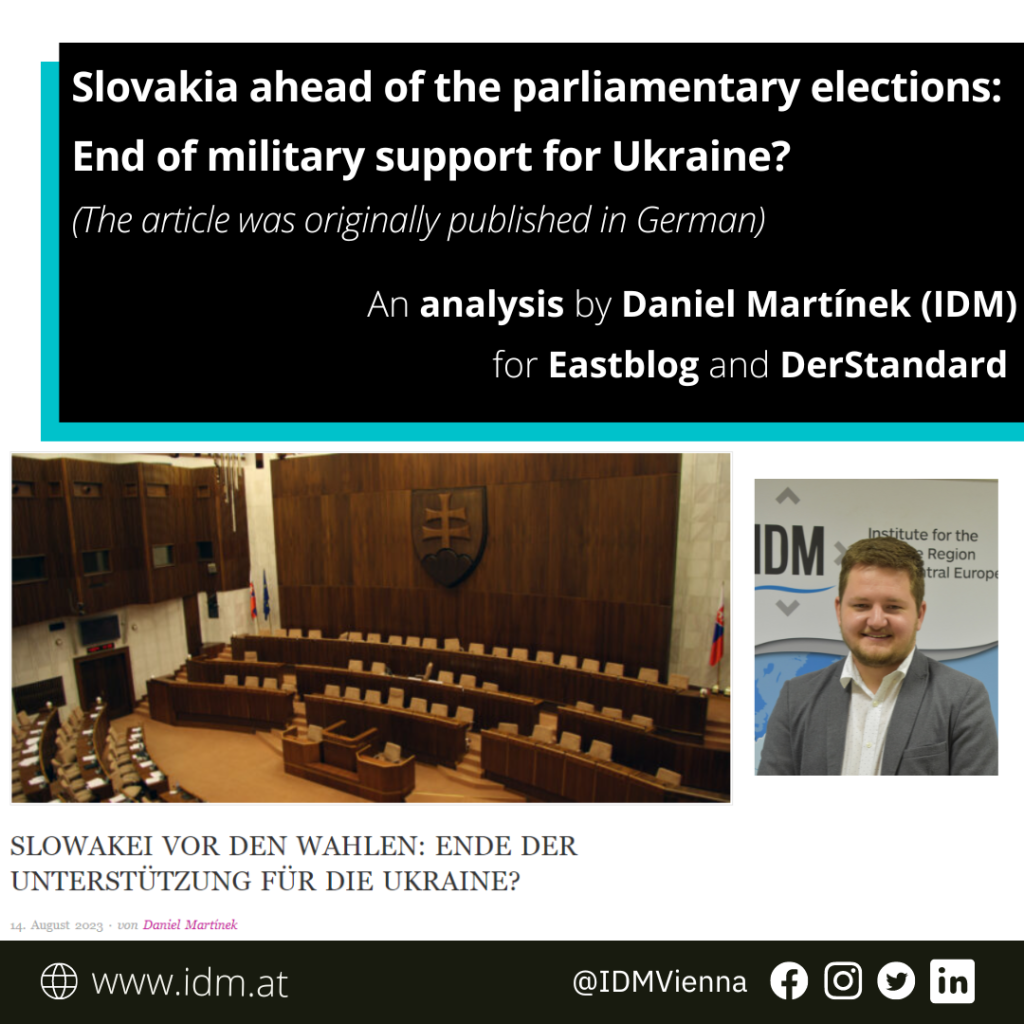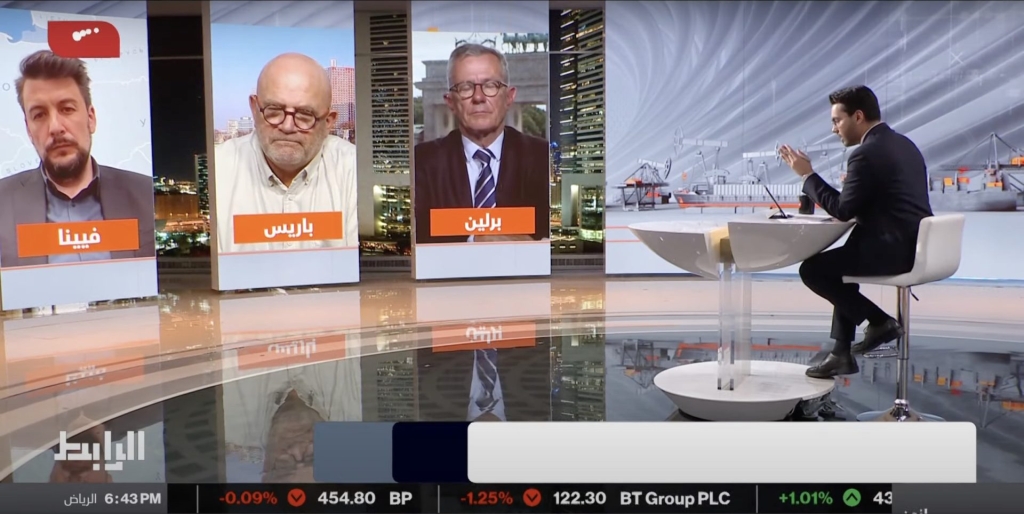Malwina Talik for ED News

Our colleague Malwina Talik was interviewed by ED News about the modus operandi of the EU asylum and migration system and the impact of migration on the EU economy.
You can read the interview here.

Our colleague Malwina Talik was interviewed by ED News about the modus operandi of the EU asylum and migration system and the impact of migration on the EU economy.
You can read the interview here.

Kinga Brudzinska wurde kürzlich in einem Artikel von Die Welt zitiert, der die wirtschaftliche Transformation in Mittel- und Osteuropa (CEE) analysiert und wie diese Länder – zum Beispiel in der Digitalisierung von Finanzdienstleistungen – Westeuropa überholt haben.
Lesen Sie den Artikel hier.

In an interview for Eurasia Diary English, Malwina Talik (IDM) explained why she finds opening of a new front in Poland unrealistic under current circumstances and how Poland perceives incidents at the border to Belarus.
After months of political turmoil, the Slovaks will decide on a new parliament in the upcoming early elections in September. The new government could align Slovakia with the Russia-friendly states in Central Europe. Daniel Martínek analyses the election scenarios and their implications in the region.

It is hard to imagine a more challenging time to govern than what former Slovak Prime Minister Igor Matovič experienced. The Covid-19 pandemic, the war in Ukraine and the related migration, as well as inflation and energy crises have certainly contributed significantly to the downfall of his governing coalition, which was formed after the 2020 parliamentary elections. However, the main cause of instability and the potential collapse of the government stemmed not only from all these crises but also from a series of personal hostilities between the leaders of the coalition parties. The vote of no confidence and the gradual withdrawal of coalition partners and their ministers eventually culminated in the establishment of an expert government in June of this year. It is intended to lead the country until the early elections scheduled for 30 September.
Four opposition parties, amidst three years of internal and inter-party conflicts, have pledged to establish a stable government. According to current opinion polls, Slovak citizens are inclined to believe in this commitment, especially as all the former governing parties are grappling to surpass the five per cent electoral threshold. Robert Fico, the former long-serving prime minister and leader of the left-wing nationalist party SMER-SSD, currently holds the highest approval rating (20 per cent as per July polls). His party promises experience and order, with a particular focus on countering the liberal “Progressive Slovakia” party led by Michal Šimečka, which, according to current polls, might secure second place with around 16 per cent of the vote.
Rise of political defectors
Behind them in third place (at 11 per cent) are the defectors from the SMER-SSD party, who have been organising themselves under the leadership of Petr Pellegrini, the successor to Fico as prime minister (2018-2020), within the party “HLAS – Social Democracy” (HLAS-SD) since 2020. Although party members attempted to distance themselves from the corrupt and mafia-associated SMER party in response to the lost elections three years ago, many Slovaks still view them as partly responsible for the decline of the rule of law and the erosion of democratic institutions during the years of the SMER government.
Since 2021, former members of the “People’s Party Our Slovakia” have also joined the “Republic” movement. According to current election forecasts, the national-conservative party led by Milan Uhrík can expect to secure around 10 per cent of the vote, which means that seats in the parliament – whether within the governing coalition or the opposition – are guaranteed for them. Although the four party leaders swiftly ruled out cooperation with one or another party upon media inquiry, various post-election scenarios for collaboration are conceivable at this point. However, one thing is certain: the majorities in the new parliament will significantly hinge on which small parties surpass the five per cent threshold and thereby become the “kingmakers” after the election.
Scenarios: Return of old suspects and their controversial mafia-like politics?
If the “Bulgarian” scenario – meaning the impossibility of coalition formation and recurring snap elections – does not occur, and the victorious parties reach an agreement, two directions of post-election development can be anticipated. The future government could form from a coalition of the parties “HLAS-SD” and “Progressive Slovakia”, alongside the participation of smaller parties such as “KDH” (Christian Democratic Movement), “SaS” (Freedom and Solidarity), and “Sme Rodina” (We Are a Family). A clear pro-European and pro-Atlantic foreign policy direction, coupled with continued efforts to combat corruption, enhance judicial independence, and build trust in governmental institutions, would be expected in such a case for the upcoming electoral cycle.
Another post-election scenario might not appear as promising to proponents of the EU project and transatlantic cooperation. This year’s election could mean the return of experienced Prime Minister Robert Fico and his party SMER-SSD, which, despite its willingness to form a coalition with its social-democratic offshoot party HLAS-SD, possesses limited coalition potential. This could compel Fico’s party not only to partner with the HLAS-SD party but also to join forces with the nationalist “Republic” party, labelled as radical and extremist by some experts. By forming a coalition alongside the SNS party (Slovak National Party), these four parties could even secure an absolute majority in the parliament. The revival of the SMER-SSD party is viewed by many as a resurgence of party members associated with corruption and controversial political practices. After a three-year hiatus, a revival of a mafia-like political culture could be on the horizon. The end of this culture was the hope of many protesters during the mass demonstrations triggered by the murder of investigative journalist Ján Kuciak and his fiancée Martina Kušnírová in 2018, which rallied against the government.
Pro-Western liberals versus pro-Russian conservatives
Dissatisfaction with current Slovak domestic and foreign policy, deteriorating living conditions due to ongoing crises and the war in Ukraine, as well as frustration with the conflict-ridden government of the past three years are leading significant portions of the Slovak population to support parties that offer simple – often populist and radical – solutions. This explains the current high popularity of the SMER-SSD party as a symbol of corruption, as well as the extremist, strongly nationalist Republic party.
Such a government coalition would not only deal a heavy blow to the development of liberal democracy in the country, but with the involvement of the Republic party, Slovakia could follow the ideological path of the Hungarian Fidesz party or the Polish PiS party. Equally important, however, is that these elections are also of fundamental importance at the regional and European level. In the event of Fico’s return as prime minister, which will depend on the support of the Republic movement led by Uhrík, in addition to a strongly EU-sceptic and anti-Western foreign policy, an end to Slovak military support for Ukraine is to be expected. This development would be supplemented by a clear rejection of EU sanctions against Russia and the restoration of friendly relations with the Russian Federation. Both party leaders do not hide their support for Orbán’s style of neutrality and have even become some of the biggest disseminators of pro-Russian propaganda in the country, as evidenced by Uhrík’s speeches and Fico’s social media activities.
Decreasing support for Ukraine?
These increasing pro-Russian narratives and sympathies are not unique to Slovakia. They can be observed across nearly all European countries, as evidenced by the growing support for parties like the FPÖ in Austria or the AfD in certain German states. While the Republic party, unlike the SMER-SSD party, consistently questions Slovakia’s membership in the EU and NATO, the country will likely remain firmly anchored in Euro-Atlantic structures even after the election.
However, an entirely different dynamic could emerge in Central Europe following the elections, where Slovakia, by discontinuing its military support for Ukraine, might align with the ranks of so-called neutral states, like Hungary or Austria. Ultimately, this could also signify a realignment of forces within the currently geopolitically inactive Visegrád Group. As a result, two camps would emerge: those actively providing military and humanitarian support to Ukraine (Czech Republic, Poland) and those refusing to provide arms to the beleaguered state while aiming to maintain close relations with Moscow (Hungary, Slovakia). Such a development could contribute to even greater dysfunctionality within this once-significant Central European cooperation format.
The original version of the article (in German) has been published at Eastblog of the University of Vienna and in the daily newspaper DerStandard.

In an interview for Eurasia Dairy, Sebastian Schäffer, IDM Director, put the losses of European companies in the Russian Federation into perspective and emphasized that we should not forget the price people in Ukraine are paying in this war. Read the whole interview in English here.
Also available in Azerbaijani.

IDM Director Sebastian Schäffer spoke with Asharq News about the termination of the Grain Deal, the meeting of the NATO-Ukraine-Council on 26 July 2023, the heinous attacks by the Russian Federation on Ukrainian ports and the destruction caused in Odesa as well as the Danube as an alternative export route.
You can watch the interview (in Arabic) here.

IDM Director Sebastian Schäffer was invited to talk about the priorities of the current EU summit in Brussels for Asharq News, a TV station based in Dubai. Together with colleagues from Berlin and Paris, he analysed possible outcomes, especially with regards to security guarantees for Ukraine as well as the next round of sanctions towards the Russian Federation. When being asked who is paying are higher price for the sanctions, Moscow or Brussels, Schäffer stated that Ukraine in paying the highest price with being invaded, infrastructure being destroyed as well as people being killed. The upcoming NATO summit as well as the relationship between the EU and China were also part of the discussion.

Am 01. Juni 2023 trafen sich fast 50 Staats- und Regierungschefs zum 2. Gipfel der Europäischen Politischen Gemeinschaft (European Political Community – EPC) in der Republik Moldau. Sebastian Schäffer sprach mit Bianca Ambros bei PULS 24 über Hintergründe und Botschaften des Treffens: https://bit.ly/3IUKGkt

Sebastian Schäffer was interviewed by Asharq News regarding Yevgeny Prigozhin, the former chef of Putin and head of the Russian mercenary group Wagner, insinuating a possible civil war like in 1917 due to lack of commitment from the Kremlin. While the guest from Russia, Elena Suponina – Consultant at the Center for International Affairs, tried to frame it as a military tactical maneuver, the IDM Managing Director offered different perspectives. While it might very well be all a charade, there is also the possibility to publicly blackmail the Kremlin to provide what Prigozhin demands. His explicit accusations of unprofessionalism and corruption against Defense Minister Sergei Shoigu and Chief of the Russian Armed Forces General Staff Valery Gerasimov could also indicate political ambitions. In any case remarkable are his comments regarding Ukraine: Instead of denazification and demilitarization, everyone globally now knows the country, which is now highly equipped as well as able to “(…) easily and successfully work with all systems – Soviet, NATO systems, you name it”.